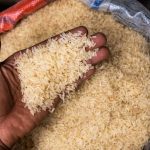The price of rice in Nigeria has taken a sharp downturn in recent weeks, with a 50kg bag now selling for an average of N54,000, down from N58,000 in April. The sudden drop has been linked to both a wave of panic caused by rumours of deadly rice and a significant oversupply of imported rice from India.
Consumers in border regions like Badagry in Lagos State and Idiroko in Ogun State were alarmed by voice notes and WhatsApp messages warning people to avoid rice consumption, claiming that over 70 people had died from eating contaminated rice. Although the Nigeria Customs Service in Seme swiftly dismissed the rumours as false, demand for rice plunged. In some areas near the borders, prices fell as low as N50,000 per 50kg bag as buyers stayed away.
Disturbed by the collapsing sales, rice traders in Badagry released videos debunking the viral claims. They insisted that no deaths had been recorded and labelled the circulating voice messages as fake and damaging.
But beyond the rumour, a more structural factor is at play: oversupply. A report by S\&P Global revealed that parboiled rice prices across West Africa have slumped due to excessive imports from India and low demand in the region. In countries like Benin and Togo, importers are grappling with full warehouses and dwindling buyers.
The logistics of rice transport have also shifted. Where breakbulk shipping used to be cheaper, container freight is now nearly as affordable, prompting traders to opt for smaller-volume imports via containers. Prices for both options have narrowed to just $3–$4 per metric tonne.
India remains the primary supplier, exporting roughly 4.9 million metric tonnes of rice to West Africa between April 2024 and January 2025. Benin Republic led the import list, followed by Guinea and Ivory Coast.
Nigeria, despite its ban on rice imports through land borders, continues to be the largest market for Benin’s rice exports. Smuggling and informal trade routes keep rice flowing into the country. As a result, the influx of Indian parboiled rice has forced down prices. Indian rice that cost N58,000 per 50kg bag in late April is now selling for N54,000, while locally grown rice has dropped by N10,000 to N62,000.
The dual effect of health rumours and market oversupply has disrupted rice trade dynamics in Nigeria, raising concerns among importers and local farmers. With trust shaken and markets flooded, the coming weeks will determine whether prices stabilize or fall further.










